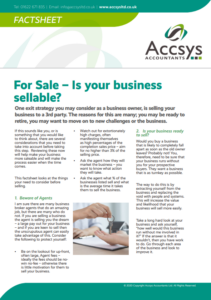For Sale – Is your business sellable?

One exit strategy you may consider as a business owner, is selling your business to a 3rd party. The reasons for this are many; you may be ready to retire, you may want to move on to new challenges or the business.
If this sounds like you, or is something that you would like to think about, there are several considerations that you need to take into account before taking this step. Reviewing these now will help make your business more saleable and will make the process easier when the time comes.
This factsheet looks at the things your need to consider before selling.
1. Beware of Agents
I am sure there are many business broker agents that do an amazing job, but there are many who do not. If you are selling a business the agent is selling you the dream – a large pay out for your business – and if you are keen to sell then the unscrupulous agent can easily take advantage of this. Consider the following to protect yourself:
- Be on the lookout for up-front, often large, Agent fees – ideally the fees should be no-win no-fee – otherwise there is little motivation for them to sell your business.
- Watch out for extortionately high charges, often manifesting themselves as high percentages of the completion sales price – aim for no higher than 3% of the selling price.
- Ask the agent how they will market the business – you want to know what action they will take.
- Ask the agent what % of the businesses listed sell and what is the average time it takes them to sell the business.
2. Is your business ready to sell?
Would you buy a business that is likely to completely fall apart as soon as the old owner leaves? Probably not! You, therefore, need to be sure that your business runs without you for your prospective buyers. They want a business that is as turnkey as possible.
The way to do this is by extracting yourself from the business and replacing the void with people and systems. This will increase the value and likelihood that your business will sell more easily.
Take a long hard look at your business and ask yourself, “how well would this business run without me involved in it?” If the answer is that it wouldn’t, then you have work to do. Go through each area of the business and look to improve it.
Tidy it up from the top to the bottom – tidy up the filing system, the database, the office or warehouse, tidy up the systems. Make the business as attractive as you can to a potential purchaser.
As a by-product of this the business will run better and will be more profitable so it’s a win-win.
3. Do you want to continue to work in the business after you sell it?
Many deals will require you to do a handover period – the less you are involved in the day to day running of the business, the less this time will be.
If you don’t want to work in the business at all post-handover, then the more systems and processes you have involved, the better.
4. Get your finances straight
The clearer your management information is the better – make sure you use a product like Xero and ensure it’s up to date. Make sure you can offer any potential purchasers up-to-date management accounts.Whilst you are there, resolve any HMRC issues you have and make sure you are never late with tax or tax returns.
Consider paying off any loans or HP – get your credit control up to date. The more simple you can make the purchase the better.
5. Be prepared for a slow process
If you have ever sold a house then you know how frustrating that can be – selling a business takes this to another level. If your business was marketed and sold in a year, then it would be considered an extremely fast sale.Plan for a 2-4 year process.
6. Be real about the price
Your business will be worth whatever you are willing to accept and what the buyer is willing to pay. Many business owners, who have fallen out of love with their businesses, are so keen to sell they will accept low offers. Sometimes ridiculously low.Others are delusional about what the business is worth and won’t consider anything other than a sky high offer.The true price and value sits somewhere in between.The question to ask your self when considering an offer is would you be happy to pay this for the business? You can tell if you are being low balled with an offer.
7. Consider what it is that you are selling
Are you selling the shares of the business or the trade and assets? The former is cleaner and easier, and the latter leaves you with the company but no trade. The sales of shares is often more tax efficient for the seller.The buyer will always want to buy the trade and the seller should always want to sell the shares. The reasons are varied. For example, a trade and asset sale will mean no stamp duty for the purchaser and a clean, less risky purchase. The seller will potentially lose out on entrepreneurs relief and will be left with an empty company to deal with.So be aware of all implications before accepting an offer.
8. Don’t forget the 3rd Parties
If you are selling and you have leases in the business, or you are part of some regulation that requires consent before you sell, then get this early. It could cause a deal to fall through.
9. Understand how you are taxed
Tax depends on many factors but, broadly speaking, sales of shares in a trading company attract a 10% tax on the gain through entrepreneur’s relief. Most small business owners pay nothing for their initial shares and therefore this normally equates to a 10% tax on the sale price.Involve us before you finalise a deal to make sure this deal is in your best interests.
10. What about the cash in the business?
The cash in the business is often an issue, so the normal way of extracting this is by adding it to the asking price for the business or taking it as a pre-sale dividend. The former is more tax efficient if you are able to claim entrepreneurs relief on a sale.
11. Consider what life will be like after you sell
Do you want to sell at all? Your business may be giving you a purpose in life and the thought of a couple of million in the bank is great, but what will you do with your time?
Often when you sell you won’t be able to run a similar business for a number of years. If the business formed a big part of your life do you really want out?
Are there alternatives you should consider such as handing the business over to employees or children. Or stepping back and employing someone to run it for you.
If you are considering selling your business and would like assistance, or would just like to discuss how to make your business more efficient, introduce systems or any of the other factors discussed here, please contact us.


